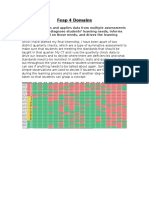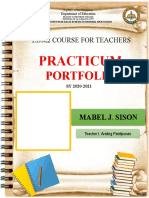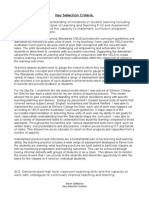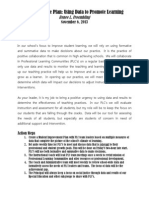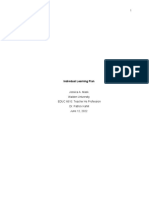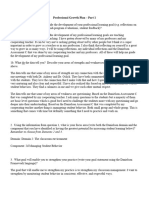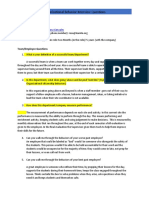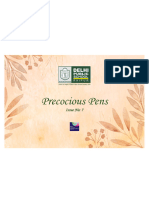0 ratings0% found this document useful (0 votes)
181 viewsFeap 5 Evidence
Feap 5 Evidence
Uploaded by
api-264363128The document outlines the six FEAP domains related to professional development and responsibilities. It provides examples of how the intern has met each domain during their teaching experience. Specifically, it discusses: setting goals to improve teaching based on student needs; using research and data to improve instruction and student achievement; collaborating with colleagues to evaluate learning and improve lessons; using a classroom management app to communicate with parents; engaging in professional development opportunities to improve teaching; and implementing strategies learned from training and observations.
Copyright:
© All Rights Reserved
Available Formats
Download as DOCX, PDF, TXT or read online from Scribd
Feap 5 Evidence
Feap 5 Evidence
Uploaded by
api-2643631280 ratings0% found this document useful (0 votes)
181 views6 pagesThe document outlines the six FEAP domains related to professional development and responsibilities. It provides examples of how the intern has met each domain during their teaching experience. Specifically, it discusses: setting goals to improve teaching based on student needs; using research and data to improve instruction and student achievement; collaborating with colleagues to evaluate learning and improve lessons; using a classroom management app to communicate with parents; engaging in professional development opportunities to improve teaching; and implementing strategies learned from training and observations.
Original Title
feap 5 evidence
Copyright
© © All Rights Reserved
Available Formats
DOCX, PDF, TXT or read online from Scribd
Share this document
Did you find this document useful?
Is this content inappropriate?
The document outlines the six FEAP domains related to professional development and responsibilities. It provides examples of how the intern has met each domain during their teaching experience. Specifically, it discusses: setting goals to improve teaching based on student needs; using research and data to improve instruction and student achievement; collaborating with colleagues to evaluate learning and improve lessons; using a classroom management app to communicate with parents; engaging in professional development opportunities to improve teaching; and implementing strategies learned from training and observations.
Copyright:
© All Rights Reserved
Available Formats
Download as DOCX, PDF, TXT or read online from Scribd
Download as docx, pdf, or txt
0 ratings0% found this document useful (0 votes)
181 views6 pagesFeap 5 Evidence
Feap 5 Evidence
Uploaded by
api-264363128The document outlines the six FEAP domains related to professional development and responsibilities. It provides examples of how the intern has met each domain during their teaching experience. Specifically, it discusses: setting goals to improve teaching based on student needs; using research and data to improve instruction and student achievement; collaborating with colleagues to evaluate learning and improve lessons; using a classroom management app to communicate with parents; engaging in professional development opportunities to improve teaching; and implementing strategies learned from training and observations.
Copyright:
© All Rights Reserved
Available Formats
Download as DOCX, PDF, TXT or read online from Scribd
Download as docx, pdf, or txt
You are on page 1of 6
FEAP 5 Domains
Feap5a- Designs purposeful professional goals to strengthen
the effectiveness of instruction based on students needs
After each supervisor observation, I make goals for myself to improve
certain aspects of my teaching to benefit my self and the students I am
teaching. When setting these goals, I think about what I can do to
improve in my weaknesses in a positive way. I am also thinking about
my learners and how I can engage them in learning. At the beginning
of the semester I set a goal for myself to improve students
engagement and setting expectations. I was able to meet these goals
by clearly setting academic and behavioral expectations before my
lesson and using turn and talks to improve student engagement.
Goal Sheet: http://caiseereno.weebly.com/inquiry-spring-2016/goalsheet
Feap 5b- Examines and uses data-informed research to
improve instruction and student achievement
For my inquiry this year, I decided to focus on student engagement
and how I can implement certain strategies to improve student focus
during lessons and independent work. The first thing that I had to do
was do research on things that worked for other teachers and what
strategies may not have worked. Using this data informed research
allowed me to decide what I wanted to try in my own classroom, with
my own students. Implementing these strategies helped improve my
delivery of instruction and overall helped improve student
achievement.
Feap 5c- Uses a variety of data, independently, and in
collaboration with colleagues, to evaluate learning outcomes,
adjust planning and continuously improve the effectiveness of
the lessons
Each quarter, students must take what is called a quarterly check to
gauge how well they have learned the given standards for each
quarter. For the past two quarterly checks, my CT and I have looked
over this data together, interpreted it, and used it to help us decide if
certain topics/standards needs to be revisited or retaught to the
students in whole group. This was particularly helpful right before FSA
(Florida State Assessment) because it helped my CT and I decide what
we should focus on for the review week before the test. Since the data
clearly showed a deficit in area and perimeter, that is something we
decided to focus on for a few days during review week. Because of this,
we felt very confidant and confortable, going into FSA that the
students would do well.
Feap 5d- Collaborates with the home, school and larger
communities to foster communication and to support student
learning and continuous improvement
In my classroom, we use classroom dojo as a class management
system. Dojo is an app where students have an avatar and their avatar
can gain or lose points based on certain behaviors in the classroom.
Teachers can have this app open during lessons, small group, or while
students are working independently and can easily access it when
necessary. Not only does the teacher have access to this but also so do
the students parents. They can immediately see the points that their
students receive or lose and the reason behind the points. In addition,
the teacher and the parents can communicate through the dojo
message system and can constantly be in contact with each other over
questions, comments or concerns for either party. I have been using
this since I started my final internship and it is a great way to
communicate with parents and keep them in the loop at all time.
Feap 5e- Engages in targeted professional growth
opportunities and reflective practices
Since being in internship level one, my internship school has provided
many opportunities and trainings for me to grow professionally. One
thing that comes to mind is the IRLA training that we had with Ellen
Martin. IRLA stands for Independent Reading Level Assessment
Framework. This is what the teachers use to determine what level
reader a student is at and when they will be able to move up to a
higher level. The principle at my internship school provided us with this
training so that we were able to broaden our skill set. In addition, after
supervisor and CT observations take place, I use the feedback given to
me to improve my teaching practices and so I can grow professionally.
In addition, I have been writing lesson reflections for observations done
by both my CT and supervisor.
Feap 5f- Implements knowledge and skills learned in
professional development in the teaching and learning process
Since having the IRLA training with Ellen Martin, I have been able to
use these newly learned skills in my internship classroom. I am able to
meet with students and assess their reading and comprehension
progress, as well as set goals for them so that they can grow and
improve their reading skills. In addition, I am constantly learning new
skills and techniques from my collaborating teacher and implementing
those techniques when I teach lessons on my own. After my supervisor
observation, I was given the advice that I should watch whom I call on
to answer questions, because I tend to call on the same people over
and over again. To fix this problem, I use the random select button on
classroom dojo, to randomize who gets to answer questions during
lessons. This allows everyone a chance to answer and makes those
quiet/shy students participate as well. Below is a picture of me
randomly selecting a student to participate.
You might also like
- Professional Development PlanDocument4 pagesProfessional Development Planapi-31703893650% (2)
- Professional Development Plan InternshipDocument6 pagesProfessional Development Plan Internshipapi-270515672No ratings yet
- Feap 4 EvidenceDocument5 pagesFeap 4 Evidenceapi-264363128No ratings yet
- Professional Self Assessment FormDocument2 pagesProfessional Self Assessment FormnaspradleyNo ratings yet
- Feap 5 WeeblyDocument6 pagesFeap 5 Weeblyapi-531495599No ratings yet
- Teacher Leader Project CabralDocument17 pagesTeacher Leader Project Cabralapi-678707581No ratings yet
- Lrnproject4 1Document5 pagesLrnproject4 1api-302628955No ratings yet
- Professional Self Assessment FormDocument2 pagesProfessional Self Assessment Formapi-132786865No ratings yet
- PGP Part 1Document21 pagesPGP Part 1api-457318255No ratings yet
- Fs 1Document17 pagesFs 1Jerico SimNo ratings yet
- Professional Development Plan 2Document12 pagesProfessional Development Plan 2api-354412081No ratings yet
- Laveenas End-Of-Semester Report Fall 2021Document9 pagesLaveenas End-Of-Semester Report Fall 2021api-587543834No ratings yet
- Practicum Portfolio Sample SISON DDocument20 pagesPracticum Portfolio Sample SISON DBithey BolivarNo ratings yet
- DLP Interim Assignment #4 Jenny O'Meara NELA Cohort 4 Assignment 4.2Document4 pagesDLP Interim Assignment #4 Jenny O'Meara NELA Cohort 4 Assignment 4.2api-284825601No ratings yet
- Professional Self Assessment 2Document2 pagesProfessional Self Assessment 2api-252760395No ratings yet
- PGP Final Report SavedDocument10 pagesPGP Final Report Savedapi-531052254No ratings yet
- Objective 5Document2 pagesObjective 5api-289315030No ratings yet
- Part III - Reflection PaperDocument11 pagesPart III - Reflection Paperapi-337358416No ratings yet
- Capstone Portfolio Standard Reflection Standard 6Document2 pagesCapstone Portfolio Standard Reflection Standard 6api-279619064No ratings yet
- ALFIB MOD2 Smartphone ContentDocument7 pagesALFIB MOD2 Smartphone ContentAlexNo ratings yet
- Standard 4aDocument2 pagesStandard 4aapi-280546585No ratings yet
- Professional Self 2 TashaDocument2 pagesProfessional Self 2 Tashaapi-282666593No ratings yet
- PST Interim Review and Professional Learning PlanDocument2 pagesPST Interim Review and Professional Learning Planapi-479504572No ratings yet
- Report in Teaching EnglishDocument3 pagesReport in Teaching EnglishJaemilyn O. ValenciaNo ratings yet
- Class Literacy PlanDocument5 pagesClass Literacy Planapi-188144621No ratings yet
- Confidence Gained. at The Beginning of This Course, I Knew I Needed To Improve byDocument6 pagesConfidence Gained. at The Beginning of This Course, I Knew I Needed To Improve byapi-298988567No ratings yet
- KSC For PortflioDocument5 pagesKSC For Portflioapi-239660613No ratings yet
- Froembling Data Culture PlanDocument6 pagesFroembling Data Culture PlanGlenn E. Malone, Ed.D.No ratings yet
- Flow of The DiscussionDocument3 pagesFlow of The DiscussionJade PalacioNo ratings yet
- Topic 2 DQ 1Document1 pageTopic 2 DQ 1Hamna MushtaqNo ratings yet
- LDM 2Document15 pagesLDM 2Ha-NepTune-In 125No ratings yet
- Report of Early Childhood Professionals' Views of AssessmentDocument15 pagesReport of Early Childhood Professionals' Views of Assessmentapi-385499627No ratings yet
- Tpa Activity For EportfolioDocument3 pagesTpa Activity For Eportfolioapi-427541697No ratings yet
- Evaluation of GoalsDocument4 pagesEvaluation of Goalsapi-380557495No ratings yet
- Analysis and Use of DataDocument2 pagesAnalysis and Use of Dataapi-453481006No ratings yet
- Activity 2 Legal AspectDocument3 pagesActivity 2 Legal Aspectzaldy mendozaNo ratings yet
- Jay R ReflectionDocument2 pagesJay R ReflectionNicolas CabrejasNo ratings yet
- Types of AssessDocument78 pagesTypes of AssessJalilah RubaiNo ratings yet
- MD 5Document6 pagesMD 5api-618740462No ratings yet
- Sample Iep Goals For Homework CompletionDocument7 pagesSample Iep Goals For Homework Completionh4a0nawc100% (1)
- PGP Part 1 Fall 2023Document3 pagesPGP Part 1 Fall 2023api-707650219No ratings yet
- PhilosophyDocument3 pagesPhilosophyapi-279369297No ratings yet
- Self-Assessment and Professional Learning Plan/resilienceDocument4 pagesSelf-Assessment and Professional Learning Plan/resilienceapi-315623968No ratings yet
- Professional Self Assessment FormDocument5 pagesProfessional Self Assessment Formjma92No ratings yet
- Academic Writing Assessment in EducationDocument4 pagesAcademic Writing Assessment in EducationNURFADHILAH BINTI MOHD USUKI MoeNo ratings yet
- Activity 6 (Towards End of Placement) LINKS TO STANDARDS 1.2 6.2 6.4 7.4Document6 pagesActivity 6 (Towards End of Placement) LINKS TO STANDARDS 1.2 6.2 6.4 7.4api-474141182No ratings yet
- Unit 13Document18 pagesUnit 13shabnumNo ratings yet
- AOL 1-Module 1-3 Cabacang, GlaizaDocument16 pagesAOL 1-Module 1-3 Cabacang, GlaizaGlaiza CabacangNo ratings yet
- Activity 01 (10-17)Document5 pagesActivity 01 (10-17)jimwelluismNo ratings yet
- Rachel Turner Phase III ReportDocument12 pagesRachel Turner Phase III Reportapi-314514319No ratings yet
- PGP Final ReportDocument6 pagesPGP Final Reportapi-664378517No ratings yet
- Professional Growth Plan Final ReportDocument11 pagesProfessional Growth Plan Final Reportapi-509057610No ratings yet
- Feap 4 Artifacts and SummariesDocument5 pagesFeap 4 Artifacts and Summariesapi-308305244No ratings yet
- Reading Materials 02Document6 pagesReading Materials 02Akamonwa KalengaNo ratings yet
- Master Teacher A-EDocument13 pagesMaster Teacher A-EChuck GreenNo ratings yet
- Factor 7Document8 pagesFactor 7api-360259325No ratings yet
- Professional Self-Assessment Form 2Document2 pagesProfessional Self-Assessment Form 2api-217913850No ratings yet
- Interview Questions IndivProject2Document3 pagesInterview Questions IndivProject2Sam SamNo ratings yet
- Assessment Tool and StrategiesDocument23 pagesAssessment Tool and StrategiesHelen DiomangayNo ratings yet
- Thrive, Not Survive: Achieving Success As A First Year TeacherDocument12 pagesThrive, Not Survive: Achieving Success As A First Year TeacherbobNo ratings yet
- Monthly Wellness Tip Heat StressDocument1 pageMonthly Wellness Tip Heat StressbharathaninNo ratings yet
- Fsse3 - 5-6Document7 pagesFsse3 - 5-6Marlon JalopNo ratings yet
- Magagna, J. and Pepper Goldsmith, T. (2009) - Complications in The Development of A Female Sexual Identity.Document14 pagesMagagna, J. and Pepper Goldsmith, T. (2009) - Complications in The Development of A Female Sexual Identity.Julián Alberto Muñoz FigueroaNo ratings yet
- Ebook Teaching Your Baby To ReadDocument40 pagesEbook Teaching Your Baby To ReadSebi100% (5)
- An Editor Recalls Some Hopeless PapersDocument16 pagesAn Editor Recalls Some Hopeless PaperschbartsNo ratings yet
- Sociological Analysis of CultureDocument13 pagesSociological Analysis of CultureNathanielManzanero0% (1)
- Course Outline Introduction To Social WorkDocument3 pagesCourse Outline Introduction To Social WorkDr Aleu Garang AleuNo ratings yet
- LS - SS35 Lethbridge-Stewart - Piece of Mind - James MiddleditchDocument60 pagesLS - SS35 Lethbridge-Stewart - Piece of Mind - James Middleditcha61112BNo ratings yet
- Syllabus - Senior LitDocument4 pagesSyllabus - Senior Litapi-293225131No ratings yet
- 2265 Kosakata Bahasa Inggris Yang Paling Sering DigunakanDocument59 pages2265 Kosakata Bahasa Inggris Yang Paling Sering DigunakanRudi HartantaNo ratings yet
- Screenshot 2023-07-04 at 13.07.32Document106 pagesScreenshot 2023-07-04 at 13.07.32Poonam ShadijaNo ratings yet
- Undoing Appropriateness Raciolinguistic PDFDocument24 pagesUndoing Appropriateness Raciolinguistic PDF1dennys5No ratings yet
- Spatial Disorientation in AviationDocument12 pagesSpatial Disorientation in AviationT-CAS0% (1)
- Ra 9344Document24 pagesRa 9344thedoodlbotNo ratings yet
- Deductive and Inductive ReasoningDocument2 pagesDeductive and Inductive ReasoningVinze AgarcioNo ratings yet
- Different Types of CommunicationDocument79 pagesDifferent Types of CommunicationMark225userNo ratings yet
- Topic: Teaching Competence of Higher Secondary School Teachers With Various Aspects in Relation To Communication SkillDocument11 pagesTopic: Teaching Competence of Higher Secondary School Teachers With Various Aspects in Relation To Communication SkillAshmika ShuklaNo ratings yet
- Chapter Review Assignment C5Document2 pagesChapter Review Assignment C5Ying YiNo ratings yet
- Globalization of Performance Appraisals Theory andDocument17 pagesGlobalization of Performance Appraisals Theory andPhilip GathechaNo ratings yet
- MFLT With Other SciencesDocument7 pagesMFLT With Other SciencesNigara RakhmetzhanNo ratings yet
- Sentence Gap Filling AdvancedDocument3 pagesSentence Gap Filling Advancedrencsi0611No ratings yet
- Nature, Nurture, and Human Diversity: Powerpoint® PresentationDocument60 pagesNature, Nurture, and Human Diversity: Powerpoint® PresentationPierce SmalleyNo ratings yet
- Effective Communication: Urwa Naseer Clinical Psychologist Sughra Shafi Medical Complex NarowalDocument29 pagesEffective Communication: Urwa Naseer Clinical Psychologist Sughra Shafi Medical Complex NarowalSamia AsgharNo ratings yet
- Hypnotism MesmerismDocument32 pagesHypnotism MesmerismMuthu KumarNo ratings yet
- Case Study UOBDocument3 pagesCase Study UOBAzra IshratNo ratings yet
- Jessica Garay Mid-Term Student Teaching Evaluation Elementary s15Document5 pagesJessica Garay Mid-Term Student Teaching Evaluation Elementary s15api-281491900No ratings yet
- Course Syllabus: Remember: Learning Is Not A Spectator Sport!Document10 pagesCourse Syllabus: Remember: Learning Is Not A Spectator Sport!Antônio Luís SombraNo ratings yet
- OJT Evaluation Form For SupervisorDocument3 pagesOJT Evaluation Form For SupervisorJanielle Joy Saavedra GregorioNo ratings yet
- Cardinal IGDocument7 pagesCardinal IGKiev CalungsodNo ratings yet


